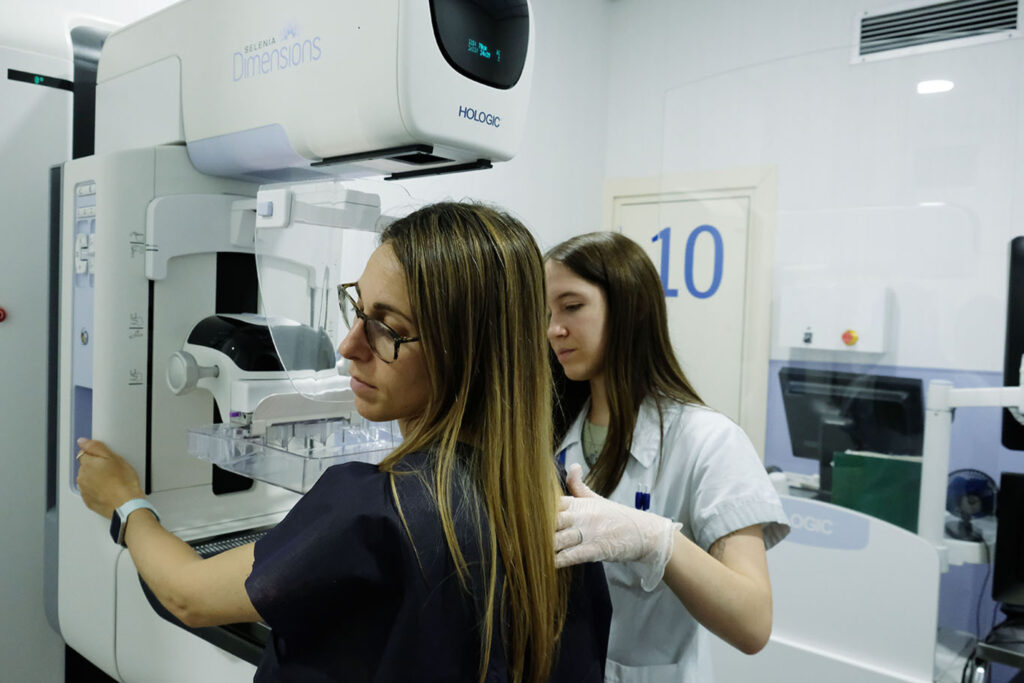Breast FNA (Fine Needle Aspiration)
What is Breast FNA?
Breast FNA (Fine Needle Aspiration) is a diagnostic procedure in which a very fine needle is used to extract fluid or cells from a lesion in the breast. It is a minimally invasive procedure performed to obtain information about the nature of the lesion.
What is this diagnostic test used for?
Breast FNA is used to:
- Drain breast cysts: Relieve pain and discomfort caused by large cysts.
- Differentiate solid lesions from complicated cysts: Help determine if a lesion is solid (and potentially cancerous) or a fluid-filled cyst.
- Aspirate axillary lymph nodes: Evaluate if lymph nodes in the armpit are affected by cancer.
Benefits of high technology in Breast FNA
Breast FNA is performed with ultrasound guidance. The radiologist uses the ultrasound machine to visualize the lesion in real-time and precisely guide the needle.

How is the procedure performed?
The breast FNA procedure consists of:
-
Preparation:
It is important to inform your doctor if you are allergic to any medication, especially local anesthesia. Also, be sure to report any medications you are taking, including aspirin, anticoagulants, and herbal supplements. For the test, we recommend wearing comfortable, easy-to-remove clothing.
-
During the test:
You will be asked to lie on the examination table for the ultrasound. Using ultrasound guidance, the radiologist will locate the lesion in real-time. Before starting, your skin will be cleaned with an antiseptic. If necessary, local anesthesia may be administered to numb the area and reduce any discomfort. Then, a fine needle will be inserted into the lesion to aspirate a small amount of tissue or fluid. Once this is done, the needle will be removed, and pressure will be applied to the area to prevent bruising. The approximate duration of the test is 15 to 30 minutes.
-
After the test:
Pressure will be applied to the puncture site to stop bleeding, and then a bandage will be placed. If you feel pain, you can take over-the-counter pain relievers to alleviate it. It is important to avoid strenuous physical activities for 24 hours following the puncture. If you notice signs of infection, such as fever, redness, or discharge at the puncture site, inform your doctor immediately. The FNA results will be ready in a few days and will be sent to your doctor, who will explain the findings and recommend appropriate treatment if necessary.
Recommendations for the test
It is essential that you follow your doctor’s instructions before, during, and after the test. If you feel pain or any discomfort during the procedure, be sure to inform the medical team so they can assist you immediately.
Are there any risks?
FNA is a safe procedure, but there are some risks:
- Mild pain: You may feel mild pain at the puncture site.
- Hematoma: A hematoma may form at the puncture site.
- Bleeding: There may be a small amount of bleeding at the puncture site.
- Infection (rare): There is a small risk of infection at the puncture site.
For your test to proceed smoothly, we ask that you arrive in advance of your scheduled time. This will allow us to complete the necessary administrative and clinical preparation.
Before the test, we will provide you with the Informed Consent form, a document with important information that you must read and sign.
If your appointment is for a Magnetic Resonance Imaging (MRI), it is crucial that you inform us about the presence of pacemakers, metallic objects, prostheses (including dental), tattoos, or medication infusion devices, such as insulin pumps.